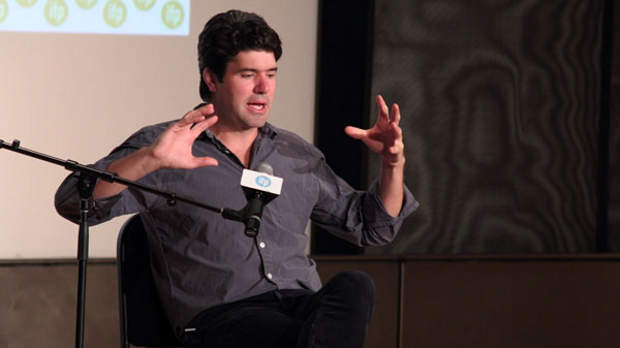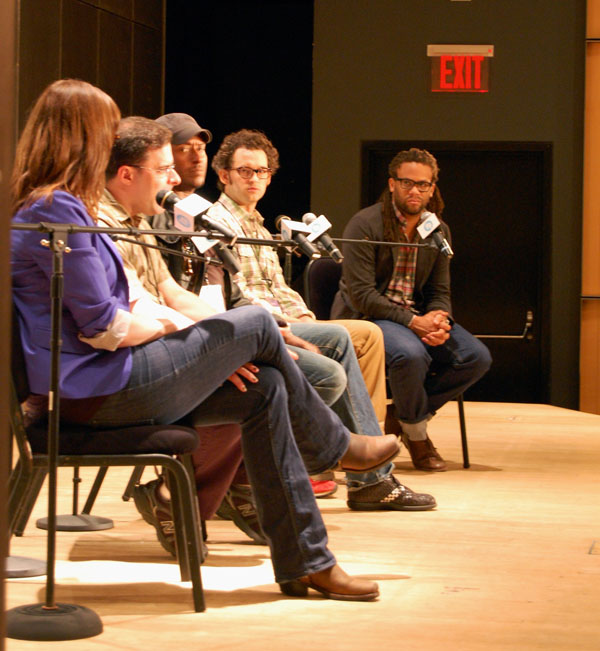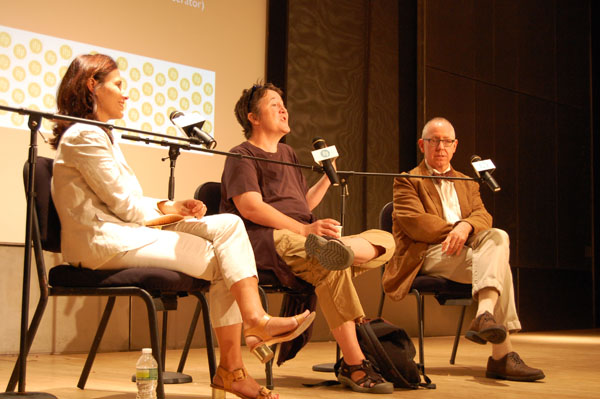 Back to selection
Back to selection
The Opportunity of a Lifetime

Is there such a thing as an opportunity of a lifetime? During the first two days of IFP’s Independent Film Week, it became clear that the answer is yes and no. Yes, a conversation, a short film, a meeting, a festival acceptance, can be the opportunity that changes everything, but a career isn’t just a year or one film – it’s a lifetime of dedication to craft. In his impressively extemporaneous speech, J.C. Chandor (above) recalled not the glories of having his first feature, Margin Call, nominated for an Academy Award for Best Screenplay, but the 15 years he spent trying to become a feature filmmaker: “I am 38 years old, and I’ve been trying to be a filmmaker as my profession probably for right about on the nose of twenty years.”
Chandor spoke in impressive detail about the years of financial insecurity and doubt he faced trying to get his first feature off the ground, including the nightmare of having a film basically ready to shoot only to have an investor pull out at the last minute. Chandor emphasized that this wasn’t the fault of some boogie man known as “the industry” keeping him down, but it was because he “had a long history of mediocre output. I never had from a creative standpoint anything that could be classified as good, let alone great.” Chandor put it simply, “I couldn’t find the story that would have have gotten me off of my ass to go make it. At the time, I never would have said that because I had five or six stories that I wanted to tell, but no one of them ever got me to put myself out there in a way that is needed.” Despite years of considering himself a failure, Chandor stuck with it, eventually coming up with the idea for the low budget Margin Call, which he called “the greatest writing experience of my life.” It was the right story at the right time, and as Chandor put it, “You’re going to make your first feature when you come to the right story.”

Chandor wasn’t the only one with a horror story or two. On a panel about The Black List (an annual list of Hollywood’s most liked unproduced screenplays started by Franklin Leonard, a development executive), Kelley Sane, the writer of Rendition and a Black List alum, remembered having spent almost a year on a screenplay called The Wedding Crasher, only to read in the press that a movie with not only the same idea but basically the same title was being released in a couple of months. It was a crushing blow that made him want to give up, but he didn’t, and he has a movie starring Reese Witherspoon, Meryl Streep and Robert Redford to prove it.
Industry experts emphasized that the making of an idea was just one step of the process. You can’t just make a film, think it will get into Sundance, and bam! you’re Soderbergh. Dylan Marchetti, the founder of Variance Films, encouraged people to have a plan of self-promotion before the festival: “You need to have a back up plan. You should be talking to people who would also give you a good sense, start formulating something before you can come in…Basic self-promotion can get you a lot further.” Everyone emphasized the importance of adapting to the market place. Talking about her career as the founder of the legendary indie Killer Films, Christine Vachon put it simply, “We’re cockroaches. We have always managed to adapt….We don’t just make theatrical features anymore. We have dedicated ourselves to making great story, tying yourself to ideas that you can only make films of theatrical length is going to prevent you from getting out there.”

After two days of lectures, panels, meetings and endless racking of brains, it was time to get back to what got us all into this mess in the first place – watching images flicker into the screen. On Monday night, IFP and Rooftop films threw up a movie screen alongside the FDR Drive and presented an IFP Labs showcase screening featuring excerpts from the 20 projects participating in the IFP Filmmaker Labs, a year-long mentorship program supporting directors through post-production and completion. Despite the fact that beer was served and the location was outside, barely a word was spoken once the excerpts began.
While the crowd watched the excerpts, I found myself searching the audience for J.C. Chandor – not J.C. Chandor the Academy Award-nominated writer/director willing to speak openly and honestly about his years of struggle, but the younger version of J.C. Chandor, a failed writer, staring down a very dark tunnel with no light in sight except for a few flickering images of other people’s films on a screen. While I can’t say I saw the next Margin Call at the screening last night, what I did see was a generation of people, staring at the sky, willing to nurture flickers until they catch fire. It was the opportunity of a lifetime.
Image of J.C. Chandor by Phillip Stearns.
